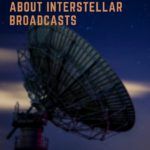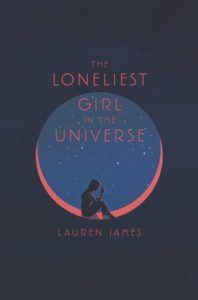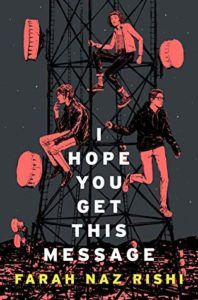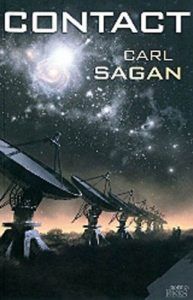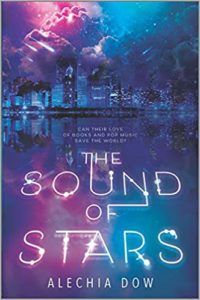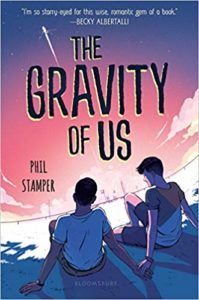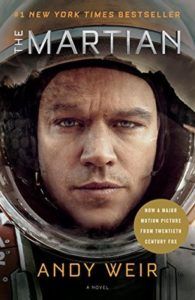The Golden Record perfectly captures this sentiment. Launched on the Voyager spacecrafts in 1977, the gold-plated phonograph holds 115 images, 27 songs, 21 sounds of Earth, and greetings in 55 languages. The record, “intended to communicate a story of our world to extraterrestrials,” according to NASA, highlights the powerful feeling of connection interstellar broadcasts inspire. As we navigate social distancing, or whenever you’re feeling like a lonely satellite, I hope you might find comfort through the broadcast connections made in these science fiction books.
The Loneliest Girl in the Universe by Lauren James
So yes, the title of this one just about summed up my quarantine feelings, so I had to read it. As the sole survivor aboard the spaceship heading towards a second Earth, 16-year-old Romy Silvers is the loneliest girl in the universe. Writing fanfics and receiving audio broadcasts from NASA keep Romy’s morale up as she plunges further into deep space. Good news arrives in the form of a new friend named J, the captain of the ship sent to join Romy’s mission. The two become penpals, but suspense begins to creep in as Romy starts receiving disturbing messages from Earth.
I Hope You Get This Message by Farah Naz Rishi
Earth has just received a “Seven Days,” call from the planet Alma. News stations broadcast around the world: it’s the end of the world as we know it in one week’s time. While this may seem rather less than hopeful, hope and connection emerge as poignant themes. Three teens come together to forge true friendships and support each other as the end draws near. Adeem, a Pakistani American teen, tries to process his feelings after his sister runs away with her girlfriend. Cate seeks the father she never knew. Jesse, a queer teen trying to help his mom make ends meet, begins spreading a message that ignites hope for humanity.
Contact by Dr. Carl Sagan
What better book to recommend as broadcast sci-fi than one written by the person who spearheaded the Golden Record project? Yes, in between winning NASA medals for his astronomical achievements, Dr. Carl Sagan wrote the novel Contact. Featuring a strong female lead (played by Jodie Foster in the movie adaption) Contact layers real science with an intriguing, cosmic mystery. Cold War–era Earth has just received a radio signal from deep space. Cracking the signal’s code, astronomer Dr. Ellie Arroway discovers instructions for building a machine to bring humans across the stars and back to the messenger.
The Sound of Stars by Alechia Dow
Love in the time of the Ilori invasion. After the Ilori colonize Earth, the aliens ban all creative expression in attempt to subdue the remaining humans. Ellie, a Black teen living in New York City, quietly subverts the new restrictions by building her secret library. When lab-born MoRr1S (Morris) discovers her, he forgoes turning Ellie in, instead asking for help procuring pop music. Despite bleak circumstances, hope blooms, from a budding romance to fun literary and musical references sampled throughout. (Alechia Dow is a former youth services librarian after all, so her book references rock.) Broadcasts of song lyrics and interviews featuring Ellie’s favorite band, The Starry Eyed, also preface every chapter.
The Gravity of Us by Phil Stamper
Seventeen-year-old Cal’s passion for social media journalism has earned him half a million followers with his daily live video broadcasts. Content with his life in Brooklyn, Cal feels less than thrilled about his dad’s selection for a NASA mission to Mars. Despite Cal’s misgivings, he and his family pick up and move to Houston so his dad can begin training. Then, Cal meets Leon, another son of a NASA astronaut, and suddenly life in Houston doesn’t seem so bad after all. Come for the NASA family drama and stay for the feel-good queer romance.
The Martian by Andy Weir
Meet Mark Watney, king of interstellar broadcasts. I may have to give this book a reread because it’s pretty on point when it comes to social isolation. When his mission goes awry, Mark Watney gets stranded alone on Mars. Thankfully Mark’s not your average astronaut. He’s a botanist, engineer, and master of comic relief. In a series of audio recordings, Mark logs his efforts to grow crops on Mars and sustain himself while he plans his escape. I highly recommend the audiobook version. If anything can make you feel better about social distancing, it’s reading about how Mark Watney’s got it worse. So, the next time you’re wondering if anybody else is out there, tune in to the comfort broadcasts in these science fiction books, put David Bowie on repeat, or jump on a Zoom date. And remember, better days lie ahead. Thanks for reading, Ground Control.
